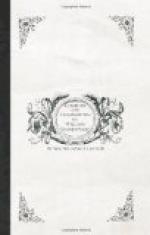“Nay, but all the great do thus. Thou must not praise them without leave and license. Praise unpermitted is plebeian praise. It is presumption to suppose that thou knowest enough of the noble and the great to discover their high qualities. They alone could manifest them unto thee. It requireth much discernment and much time to enucleate and bring into light their abstruse wisdom and gravely featured virtues. Those of ordinary men lie before thee in thy daily walks; thou mayest know them by converse at their tables, as thou knowest the little tame squirrel that chippeth his nuts in the open sunshine of a bowling-green. But beware how thou enterest the awful arbours of the great, who conceal their magnanimity in the depths of their hearts, as lions do.”
He then paused; and observing the youth in deep and earnest meditation over the fruits of his experience, as one who tasted and who would fain digest them; he gave him encouragement, and relieved the weight of his musings by kind interrogation.
“So, then, these verses are thine own?” The youth answered, —
“Sir, I must confess my fault.”
Sir Thomas.
“And who was the shepherd written here Second Shepherd, that had the ill manners to interrupt thee? Methinks, in helping thee to mount the saddle, he pretty nigh tossed thee over, {53a} with his jerks and quirks.”
Without waiting for any answer, his worship continued his interrogations.
“But do you woolstaplers call yourselves by the style and title of shepherds?”
William Shakspeare.
“Verily, sir, do we; and I trust by right. The last owner of any place is called the master more properly than the dead and gone who once held it. If that be true (and who doubts it?) we, who have the last of the sheep, namely, the wool and skin, and who buy all of all the flock, surely may more properly be called shepherds than those idle vagrants who tend them only for a season, selling a score or purchasing a score, as may happen.”
Here Sir Thomas did pause a while, and then said unto Master Silas, -
“My own cogitations, and not this stripling, have induced me to consider and to conclude a weighty matter for knightly scholarship. I never could rightly understand before how Colin Clout, and sundry others calling themselves shepherds, should argue like doctors in law, physic, and divinity.
“Silas! they were woolstaplers; and they must have exercised their wits in dealing with tithe-proctors and parsons, and moreover with fellows of colleges from our two learned universities, who have sundry lands held under them, as thou knowest, and take the small tithes in kind. Colin Clout, methinks, from his extensive learning, might have acquired enough interest with the Queen’s Highness to change his name for the better, and, furthermore, her royal license to carry armorial bearings, in no peril of taint from so unsavoury an appellation.”




